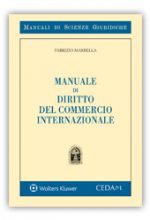Cuadernos de Derecho Transnacional, vol. 9, nr. 2, has just been released. Cuadernos is a bi-annual electronic law journal specialized in International Private Law, Uniform Law and Private Comparative Law, open to contributions in different languages. It is edited by the Private International Law Department of the University Carlos III, Madrid.
All contents can be freely downloaded. Here is the index of the section “Estudios”:
Miguel Gómez Jene, El convenio arbitral: statu quo (The arbitration agreement: statu quo)
Hilda Aguilar Grieder, Problemas de Derecho Internacional Privado en la contratación de seguros: especial referencia a la reciente directiva (UE) 2016/97 sobre la distribución de seguros (Private International Law problems of the international insurance contracts: the new directive (UE) 2016/1997 about distribution of insurance)
Isabel Antón Juárez, La oposición del régimen económico matrimonial y la protección del tercero en Derecho Internacional Privado (The opposition of the matrimonial property regime and the protection of the third party in Private International Law)
Ilaria Aquironi, L’addebito della separazione nel diritto internazionale privato dell’Unione Europea (Judicial decisions as to the causes of separation under EU private international law)
Naiara Arriola Echaniz, La Unión Europea y la Organización Mundial del Comercio: comenzando un diálogo proto- constitucional (The European Union and the World Trade Organization: a budding proto-constitutional dialogue)
Irene Blázquez Rodríguez, Libre circulación de personas y Derecho Internacional Privado: un análisis a la luz de la jurisprudencia del Tribunal de Justicia de la Unión Europea (Free movement of persons and International Private Law: an analysis in the light of the case law of the European Court of Justice)
María Asunción Cebrián Salvat, La competencia judicial internacional residual en materia contractual en España (The Spanish rules of residual jurisdiction in matters related to contract)
Silvia Pilar Badiola Coca, Algunas consideraciones sobre el régimen de la responsabilidad civil del porteador en la legislación marítima de Emiratos Árabes Unidos (Some considerations regarding the maritime carrier liability under the United Arab Emirates maritime law)
Clara Isabel Cordero Álvarez, Incidencia de las normas imperativas en los contratos internacionales: especial referencia a las normas de terceros estados desde una aproximación europea (Overriding mandatory provisions in international contracts: a special reference to foreign overriding mandatory provisions from a European approach)
Eva de Götzen, Recognition of same-sex marriages, overcoming gender barriers in Italy and the Italian law no. 76/2016 on civil unions. First remarks (Riconoscimento dei matrimoni omosessuali, superamento delle barriere di genere in Italia e legge n. 76/2016 sulle unioni civili. Prime riflessioni)
Carlos Manuel Díez Soto, Algunas cuestiones a propósito del derecho de participación del autor de una obra de arte original sobre el precio de reventa (droit de suite) (Some questions concerning the artist’s resale right (droit de suite)
Dorothy Estrada Tanck, Protección de las personas migrantes indocumentadas en España con arreglo al Derecho Internacional y Europeo de los derechos humanos (Protection of undocumented migrant persons in Spain under international and European human rights law)
Ádám Fuglinszky, Hungarian law and practice of civil partnerships with special regard to same-sex couples (Das Ungarische Recht und praxis von lebenspartnerschaften mit besonderer rücksicht auf gleichgeschlechtliche pare)
Natividad Goñi Urriza, El sometimiento de las adquisiciones minoritarias que no otorgan el control a las normas sobre el control de las concentraciones (The control under merger rules of acquisitions of non-controlling minority shareholdings)
Luis Ignacio Gordillo Pérez, El TJUE y el Derecho Internacional: la defensa de su propia autonomía como principio constitucional básico (The CJEU and International Law: the defence of its own autonomy as a basic constitutional principle)
Thais Guerrero Padrón, Sobre los funcionarios de la Unión Europea y su régimen de seguridad social: los tributos como cotizaciones sociales a efectos del TJUE (Issues about officials of the European Union and its social security regime: taxes as social contributions to the effects of the CJEU)
Carlos María López Espadafor, Lagunas en el Derecho Tributario de la Unión Europea (Gaps in the tax law of the European Union)
Isabel Lorente Martínez, Brexit y cláusulas de sumisión en los contratos internacionales (Brexit and prorrogation clauses in international contracts)
Diana Marín Consarnau, Las uniones registradas en España como beneficiarias del derecho de la UE a propósito de la Directiva 2004/38/CE y del Reglamento (UE) 2016/1104 (Spanish “registered partnerships” as beneficiaries of EU law according to the Directive 2004/38 (EC) and the Regulation (EU) 2016/1104)
Fabrizio Marongiu Buonaiuti, La disciplina della giurisdizione nel Regolamento (UE) n. 2016/679 concernente il trattamento dei dati personali e il suo coordinamento con la disciplina contenuta nel regolamento “Bruxelles I-bis” (Jurisdiction under Regulation (EU) no. 2016/679 concerning the processing of personal data and its coordination with the “Brussels I-bis” regulation)
Alfonso Ortega Giménez, El fenómeno de la inmigración y el problema de los denominados “matrimonios de conveniencia” en España (The phenomenon of immigration and the problem of the denominated “convenience marriages” in Spain)
Marta Requejo Isidro, La protección del menor no acompañado solicitante de asilo: entre Estado competente y Estado responsable (The protection of unaccompanied minors asylum-seekers: between competent state and responsible state)
Mercedes Sánchez Ruiz, La regulación europea actual sobre emplazamiento de producto y la propuesta de reforma de la directiva de servicios de comunicación audiovisual (The current European rules governing product placement and the new legislative proposal amending the audiovisual media services directive)
Stella Solernou Sanz, Los límites a la autonomía privada en el marco del contrato de transporte de mercancías por carretera (Limits on private autonomy in the framework of the contract for carriage of goods by road)
Lenka Válková, The interplay between jurisdictional rules established in the EU legal instruments in the field of family law: testing functionality through simultaneous application with domestic law (L’interazione tra le regole di giurisdizione all’interno degli strumenti giuridici dell’UE nell’ambito del diritto di famiglia: la prova del funzionamento attraverso l’applicazione simultanea del diritto nazionale)
 of the Rome I Regulation on the law applicable to contractual obligations.
of the Rome I Regulation on the law applicable to contractual obligations. Following the success of
Following the success of 